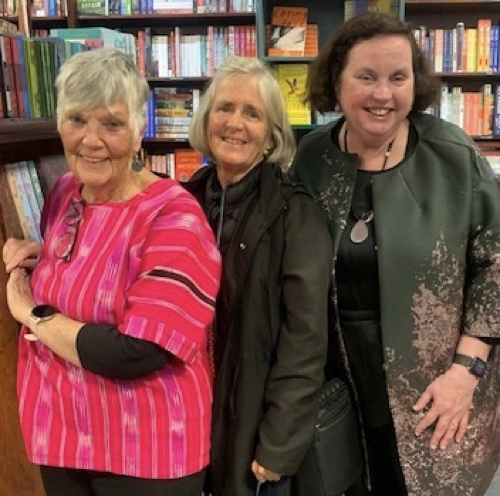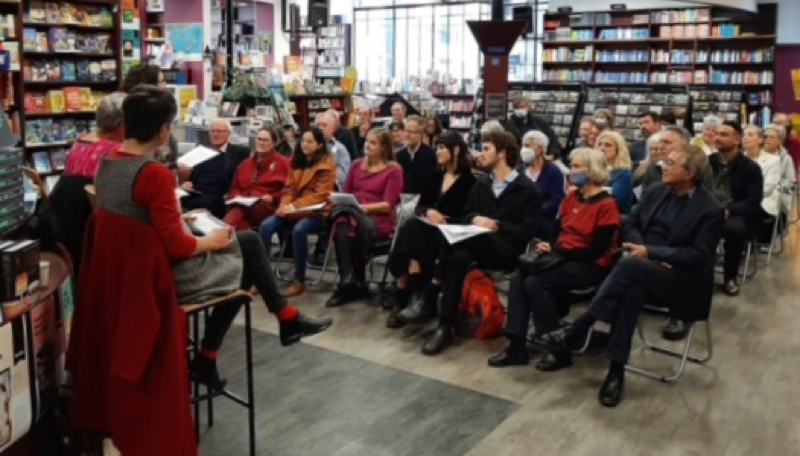The Melbourne book launch of Journeys and Operation Pedro Pan was all it might have been, with many encounters of friends and colleagues who hadn’t seen each other in ages, and many interesting things to learn about stories told in the books. Real life stories, I’m talking about. The staff of Readings bookshop in Glenferrie Road, Hawthorn were wonderfully welcoming, as were the good people of Melbourne who helped me find my way there on public transport. (I prefer to ask for personal directions, so much more fun than using the phone.)
Ralph Newmark of the Department of Spanish & Latin American Studies at the University of Melbourne was our amiable MC, and editors Ruth Adler and Jenny Cooper spoke about compiling and editing Journeys, Australian Women in Mexico. It was great to see them, especially Jenny who had come all the way from Mexico. It was Jenny who co-ordinated the Journeys publication process with the Australian Embassy in Mexico City and our designer and printer there. The Embassy financed the design and printing costs, and then we were able to donate our profits from that print run to Mission Mexico, an Australian charity operating in Chiapas.
The Embassy staff who worked with us in 2020-21 were Bernard Unkles, then Deputy Head of Mission and Lorena Zapliain, who was Public Diplomacy Officer. Well, what a surprise it was to see Lorena at the launch. She is now studying in Melbourne, and guess what, she came to the book launch with Bernard’s parents!
I was pleased to meet one of Journeys contributors, Heidi Zogbaum, and speak with her about the subject of her studies in Mexico, the author Bruno Traven. I had read and enjoyed Traven’s books and I was able to tell Heidi how surprised I was to discover her negative opinion of the author. She was happy to tell me why she’d formed her opinions about the subject of her thesis.
Manon Saur, another excellent contributor to the book and creator of the image on Journeys cover, was unable to attend the launch, but her work looked fantastic on display in the crowded bookstore. It’s very colourful and suggestive of Mexico, and sits so well on the cover designed by Ricardo Gallardo of Mutare in Mexico City.
It was lovely to meet Deborah Schnookal, author of the book about a stolen generation of Cubans – children taken from Cuba to the United States in 1960-61 “to escape communism” – and to hear some details about Operation Pedro Pan. Around 14,000 children and adolescents were airlifted to the US under this scheme, purportedly to get an education, and many were never able to return. Shnookal also spoke of the literacy programme established by the Revolution, when some 100,000 youths went to rural areas in Cuba to teach reading and writing skills.
This literacy programme was echoed by the Sandinistas in Nicaragua and in other parts of the globe, including Australia, where even today Cubans are teaching literacy skills in remote parts of our country. I have met one of these teachers, and I can assure you that adapting to life in Bourke or Brewarrina, New South Wales, is no easy task for anyone from Havana.
Operation Pedro Pan and the Exodus of Cuba’s Children by Deborah Schnookal was published by University of Florida Press, 2020.
In 1989 Deborah Schnookal, together with David Deutschmann, established Ocean Press, a publishing company focussing on Latin American politics and culture. Their first big hit was The Motorcycle Diaries, the memoir of Che Guevara, later made into a successful movie starring Mexican actor Gael García Bernal.
Our amiable MC proved himself to be a conscientious fellow, and not only because he performed his duties well and observed agreed time constraints. I say this because Dr Ralph Newmark declined our invitation to join us for dinner as he had a busy 10-hour day ahead – he was to run the conference Food and Society: Latin America, Iberia and Australia, at the University of Melbourne. He was also to present his talk on Soundscapes of Sustenance: Music & Food in Latin America, a multimedia analysis of how music and songs about Latin American foods can both internally celebrate and externally denigrate Latin American society and culture. Dr Newmark has developed two methodologies, “Aural History” and “Tasting History”, to explore political, economic, social and cultural aspects of history.
Finally, thank you to the people who sent us photos of the event and whose work I post here without permission. Please let me know if you would like some acknowledgement. You can write to: info@rivertonpress.com




